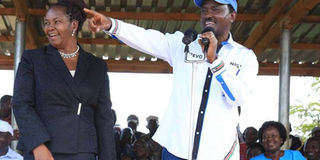Inheritance of leadership a big threat to democracy, country

Wiper Democratic Movement leader Kalonzo Musyoka endorses Edith Nyenze's quest for the Kitui West parliamentary seat, during a public rally at Kwa-Mukoma grounds on January 25, 2018. She is the widow of former MP Francis Nyenze. PHOTO | DENNIS KAVISU
What you need to know:
- In the olden days, the inheritance of leadership through bloodlines was guarded not just by steel and law but also religion.
- A successful leader, especially at the presidential level, must have such a huge appetite for success that it keeps him awake at night.
- Every man and woman must make their own way in the world. Every leader must earn his or her place at the table.
Political inheritance in Kenya is like a bad habit which, while not necessarily frowned upon, is accepted with a wink and a nudge.
We do it sometimes, folks seem to think, as a means of comforting and “rewarding” the widow or son of a dear departed leader — no harm done.
But suppose it isn’t, suppose cronyism and nepotism is distorting Kenyan politics by creating a new ‘tribe’ made up of relatives of important people, what then?
Then, it becomes a threat to democracy and the future of the country.
ELECTIONS
The visit by Opposition leader Raila Odinga to the Kabarak home of retired President Daniel arap Moi on April 12 set tongues on fire.
The sons of big people are coming together to dominate politics and eat on contracts forever, some folks screeched.
The leaders Mr Odinga chose to accompany him on that trip added fuel to the fire: Senator George Khaniri inherited the Hamisi seat from his father, Mr Nichodemus Khaniri, when he was still in his 20s and Mr Abdulswamad Nassir is the son of former Kanu diehard Shariff Nassir.
In Vihiga, like in Kitui and many other places, political inheritance seems to be a popular method of electoral decision-making.
One might argue, however fatuously, that leadership is genetic and a great leader transfers his leadership genes to his children.
POLITICAL POSITIONS
Yes, all behaviour is learnt but there could be inheritable gifts that predispose certain behaviours which are supportive of a leadership-type personality.
There could also be the nurture argument, that if you are the issue of a great leader, you learn at the feet of the master, leadership is in the air you breathe, you learn by watching, you get opportunities by being sent to best schools and exposed to the great and good and so on.
This, however, does not explain the inheriting of political positions by widows, who have no genetic connection and were not brought up by the fallen hero.
Or are we saying — as Zimbabweans accused their then-president, Mr Robert Mugabe, of believing — that leadership is transmittable through marital congress?
MONARCHS
In feudal and monarchical systems, leadership is passed down bloodlines that are fiercely protected to ensure that they are not polluted because great power, wealth and privilege follows the blood.
In the olden days, the inheritance of leadership through bloodlines was guarded not just by steel and law but also religion.
So, kings were ordained by God, as were their sons and their sons’ sons.
Studying the quality of leadership in these systems ought to conclusively tell us whether leadership is in the blood.
From Gaius Caligula to Mary Queen of the Scots, history is packed with murderous, treacherous, hopeless and clueless monarchs whose incompetence would have cost any other mortal their head.
PURPOSE
The qualities of a leader — honesty, integrity, courage, sacrifice, ambition, vision, the ability to influence people and win loyalty and so on — are not encoded in the sperm or the ovum.
These are learnt and incorporated in character. Leadership is learnt and taught.
Often, those who know no hardship in their upbringing are fatally laid back.
They are not hungry, they have no fire in the belly and very little motivation.
A successful leader, especially at the presidential level, must have such a huge appetite for success that it keeps him awake at night.
HARD WORK
In an effort to build an aristokratia — literally, “rule by the best”, a state where all power, money and glory is contained within a small circle of aristocrats — there is a major risk of creating a kakistocracy.
This is rule by the filth, the least qualified, most unscrupulous scoundrels with pretensions to “high” birth.
Every man and woman must make their own way in the world. Every leader must earn his or her place at the table.
The Kenyan aristocrat is a peasant with a thin veneer of laughable pretence masking the African tribesman beneath.
And an African tribesman or woman is the best thing any human being can be.
Let’s train, teach, make leaders. Let’s not fake them.
* * *
Truth is one of the most important tools of human progress and civilisation. It helps learning and, where necessary, reform.
If you know that the truth about your behaviour will be preserved and told for as long as you live, I believe that you will try and be at your best behaviour.
The life of Kenneth Matiba, who will be cremated today, offers many lessons in leadership and sacrifice and how not to treat another human being.
I regret that we have not fully told the story of how Mr Matiba was treated by the Kanu regime of the time, neither have we clearly and objectively explained his break with Ford and how some of the leaders now mourning him treated him and what they said about him.
Forgiveness and reconciliation is like a house. It must be built on a strong foundation of truth and accountability.
That is why those who thrive in impunity hate the truth with all their might.





